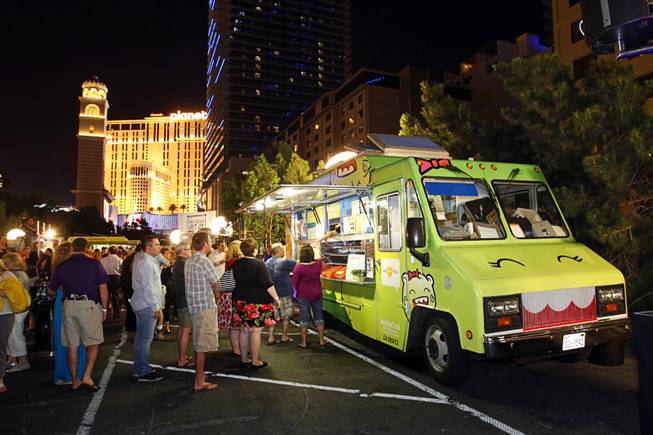
Guests line up outside the Nom Nom food truck during the Vegas Uncork’d “Follow That Truck” food festival at the Bellagio on Thursday, May 20, 2012. Celebrity chefs added to the gourmet fare from more than a dozen food trucks for the festival outside under the lights at Bellagio’s Hidden Drive.
Thursday, Sept. 6, 2012 | 10 a.m.
View more of the Sun's opinion section

J. Patrick Coolican
An attempt by brick-and-mortar restaurants to stifle competition from mobile food trucks stalled at the Las Vegas City Council on Wednesday, though only thanks to the council’s fecklessness.
As I’ve written before, this naked power grab should be killed outright, but food truck defenders can be happy, at least for now, that the issue was tabled.
Some restaurant owners and their allies in government wanted to force food trucks to stay a quarter of a mile from a stand-alone restaurant, which would have effectively barred the food trucks from downtown, unless a property owner invited the truck to vend on his lot.
That obscene distance requirement, which would be far greater than other cities that regulate food trucks, was whittled down to talk of 300 feet and 150 feet. The council was divided, and neither side could muster the votes to enact any policy at all in a scene that would have made legendary vote counter Lyndon Johnson laugh or weep.
First, though, we heard the usual unconvincing arguments as to why we should hurt the food truck business to “protect” restaurants.
It was taken as a given by a majority on the council that a food truck shouldn’t be allowed to park in front of a restaurant. Although I acknowledge that food trucks must park legally and comply with relevant health and safety codes, I have no idea why it’s supposed to be so distasteful that one business would compete against another.
Councilman Ricki Barlow likened the food trucks outside restaurants to someone selling shoes out of his car trunk outside a shoe store or a “liquor truck” competing with a bar or liquor store. It’s revealing in how Barlow views the food trucks, as basically black marketeers. (Though I applaud his creative thinking on a “liquor truck,” I’m pretty sure they’re not legal, unlike food trucks.)
Here’s a more relevant analogy for Barlow: Should we ban an entrepreneur from opening a Chinese restaurant next to another Chinese restaurant because the competition is somehow “unfair”? Should we allow just one Pho joint in our thriving Chinatown? Of course not.
Chinatown — and thriving restaurant districts just like it — is a cluster that attracts more customers together than if all the restaurants were spread out around the city.
In the same way, the restaurants and food trucks will bring more people downtown than if we just have one mediocre pizza joint on Fremont East. Competition? Yes, but this is a good thing, as the mix of food choices will bring more customers.
We were also told repeatedly that owners have invested so much more money in their restaurants and thus face a competitive disadvantage with food trucks.
This implies that opening a food truck is somehow not a major investment, requiring a pickup truck and a Costco card.
Not so. Tom Dennis, who got laid off from an armored car company, says he’s put $60,000 into his food truck business, The Redneck Kitchen. He and his four employees work lunch, cooking at local call centers and other office locations, and then do dinner and a late night bar shift. He’s paying his bills but by no means getting rich, he says.
Lisa Popovsky makes Roamin’ Dough, homemade pastries that are like Hot Pockets. (“A pie in every pocket!”) She was director of a local nonprofit that did child abuse prevention until it went under. She’s spent $50,000 on her business.
Have brick-and-mortar restaurants spent more? Yes. But you know what they get in exchange for their investment? Air conditioning, tables and chairs, real flatware and a bathroom — all things that customers might want and that serve as a competitive advantage over food trucks.
Unfair! To level the playing field with food trucks, I think we should force the brick-and-mortar restaurants to close their bathrooms.
Yes, that’s a fine idea, and I hope the council will take it up soon.

Join the Discussion:
Check this out for a full explanation of our conversion to the LiveFyre commenting system and instructions on how to sign up for an account.
Full comments policy